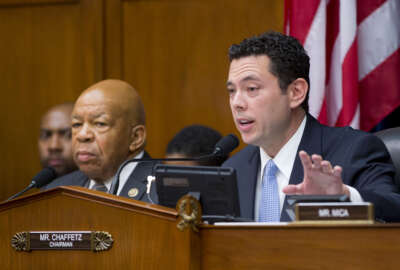
5 bills House lawmakers wanted to act on before summer break
The House Oversight and Government Reform committee passed a series of bills during a July 12 markup hearing aimed at improving and reforming digital record-keeping...
House lawmakers are eager to accomplish something — anything — before they leave for the summer.
The House Oversight and Government Reform committee passed a series of bills during a July 12 markup hearing aimed at improving and reforming digital record-keeping practices and making federal agencies and oversight more efficient and accessible. The bills will now go to the House floor for a vote.
Electronic Message Preservation Act
The Electronic Message Preservation Act would direct the Archivist of the United States to create and disseminate regulations regarding the storage of any electronic messages, primarily emails, regarding the operations of the government. These records would have to be collected and organized to be accessible through an electronic search.
It would also require the Archivist to make annual reviews of the efficacy of these regulations, and report to Congress on the results.
“According to the National Archives and Records Administration, approximately 73 percent of agencies continue to print and file hard copies of email messages,” said Ranking Member Elijah Cummings (D-Md.), who introduced the bill in 2015. “This means that these records are more likely to get lost, and are harder for the agency to retrieve during record searches under the Freedom of Information Act. This would simply codify what the agencies are already required to do under a directive issued by the archivist and director of [the Office of Management and Budget] in 2012.”
Federal Records Modernization Act
The Federal Records Modernization Act would update the required punishments and accountability of agencies when it comes to the preservation of federal records.
“The primary change this bill would make to current law would be to require the head of an agency to suspend an employee if the agency’s inspector general finds the employee willfully and unlawfully destroyed a federal record,” Cummings said.
Chat with Jonathan Alboum, USDA CIO, July 26 at 2 p.m. Sign up here.
In addition, the bill would create a “senior agency official for records management,” to be held accountable for the agency’s actions.
Getting results through Enhanced Accountability and Transparency Act
“Our good government legislation has a simple goal: help agencies eliminate wasteful duplication, get rid of confusing fragmentation, and most importantly, save taxpayer dollars,” said Rep. Tammy Duckworth (D-Ill.).
The Getting results through Enhanced Accountability and Transparency Act would direct the Government Accountability Office to separately aggregate the potential costs of duplication and waste as it conducts routine audits.
In addition, it would require agencies to include efforts and strategies to reduce waste and duplication in their annual reviews. It also would expand the duties of certain agency executives to make them accountable for improving coordination and reducing duplication and fragmentation both within their own agency and between other agencies.
Committee Chairman Jason Chaffetz (R-Utah) commented that agencies would now have to take into account in their annual audits some of the more than 600 recommendations GAO identifies, and would need to respond to GAO’s biannual reports.
“HR 5033 is exactly the kind of bill this committee needs to consider,” said Cummings.
GAO Mandates Revision Act
The GAO Mandates Revision Act would eliminate four audits that GAO is mandated to perform, and alter the required timeframes of four more.
“By eliminating statutorily required GAO reports that are no longer needed, or maybe needed on a less frequent basis, the GAO is therefore able to redirect its resources to more time-sensitive Congressional priorities,” said Rep. Jody Hice (R-Ga.).
Some audits, which GAO is required to perform every 60 or 180 days, would be extended to annual or biannual requirements. Others would be scheduled for after 2020.
GAO Access and Oversight Act
Finally, the GAO Access and Oversight Act would increase GAO’s access to certain records and information, such as Social Security records and the National Registry for New Hires, for the purpose of audits.
“Over the past six years, GAO has identified over 200 areas of duplication, overlap or fragmentation and recommended more than 600 corrective actions in these areas,” Rep. Buddy Carter (R-Ga.). “Congress and federal agencies have addressed some of these actions, resulting in $125 billion in savings from 2010 through 2025. However, the GAO’s effectiveness is tied to its ability to access federal agency records and fully audit government programs. ”
Copyright © 2025 Federal News Network. All rights reserved. This website is not intended for users located within the European Economic Area.
Daisy Thornton is Federal News Network’s digital managing editor. In addition to her editing responsibilities, she covers federal management, workforce and technology issues. She is also the commentary editor; email her your letters to the editor and pitches for contributed bylines.
Follow @dthorntonWFED




